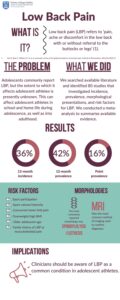Key words: low back pain, adolescents, athletes.
In this blog, we will explain the results of our recent systematic review published in BJSM. We conducted a systematic review and meta-analysis of studies examining the incidence, prevalence, risk factors, and morphological presentations of low back pain (LBP) in adolescent athletes (aged 10-19 years) to synthesise existing evidence (1).
Why is this study important?
Low back pain is common and is a leading cause of disability worldwide. It is prevalent in adolescents (age range 10-19 years), and while it usually resolves quickly, for some it has the potential to affect them into adulthood. This is significant, as a previous episode of LBP is a risk factor for a future episode. For some adolescent athletes, LBP can disrupt participation in sport, which can interrupt the development of a lifetime habit of exercise. It is important to understand LBP in adolescent athletes to prevent the potential negative consequences of LBP, such as reduced physical activity or sport participation and potential continued LBP later in life. A starting point to a good understanding of this condition is the epidemiology, specifically prevalence and associated risk factors. This study is important since it is the first synthesis of evidence on the incidence and prevalence of LBP in adolescent athletes.
How did the study go about this?
We searched five databases for studies that investigated the incidence or prevalence of LBP in adolescent athletes. There were 80 studies included. We determined the incidence and prevalence reported in each study, and where possible, combined studies that examined the same time period using weighted means. Studies with more participants carried a greater weight. We also examined factors which could impact the incidence or prevalence reported and determined how much these factors affected the results using meta-regression.
What did the study find?
We found that LBP was common in adolescent athletes. The incidence and prevalence had a wide range, which was mainly due to differences in the way LBP was defined in the studies, and the quality of the study methods for assessing LBP. In fact, in many studies, LBP was defined poorly or unclearly. Factors that could potentially increase risk of LBP in adolescent athletes were:
- sport participation
- sport volume/intensity
- concurrent lower extremity pain
- overweight/high BMI
- older adolescent age
- female sex
- family history of LBP
Spondylolysis was the most commonly reported morphology among thirteen studies that reported on specific morphologies associated with LBP.

What are the key take-home points?
LBP is common among adolescent athletes, although our understanding is still limited by the lack of high-quality prospective studies with a standardised and clear LBP definition. While participation in sport and exercise is generally protective for LBP, in this population, participation in sport appeared to increase risk in some cases. We do not know how much participation is protective or increases risk. Some sports seem to be associated with higher LBP prevalence. High imaging rates in adolescents may be associated with spondylolysis being the most reported morphology. Further research into methods of diagnosis and treatment in this population may be warranted.
Authors names and affiliations:
Julia Wall (1)
William P. Meehan III (2)
Katharina Trompeter (3,4)
Conor Gissane (1)
David Mockler (5)
Nicol van Dyk (6,7)
Fiona Wilson (1)
1. Discipline of Physiotherapy, School of Medicine, Trinity College Dublin, Dublin, Ireland.
2. The Micheli Center for Sports Injury Prevention, Division of Sports Medicine, Boston Children’s Hospital, Harvard Medical School, 9 Hope Avenue-Suite 100, Waltham, MA 02453, USA.
3. Department of Applied Health Sciences, Division of Physiotherapy, Hochschule für Gesundheit (University of Applied Sciences), Bochum, Germany.
4. Department of Sports Medicine and Sports Nutrition Ruhr-University Bochum, Bochum, Germany
5. John Stearne Library, Trinity College Dublin, Dublin, Ireland.
6. High Performance Unit, Irish Rugby Football Union, Dublin, Ireland
7. Section Sports Medicine, Faculty of Health Sciences, University of Pretoria, Pretoria, South Africa
References:
(1) Wall J, Meehan, WP, Trompeter K, et al Incidence, prevalence and risk factors for low back pain in adolescent athletes: a systematic review and meta-analysis British Journal of Sports Medicine Published Online First: 23 September 2022. doi: 10.1136/bjsports-2021-104749